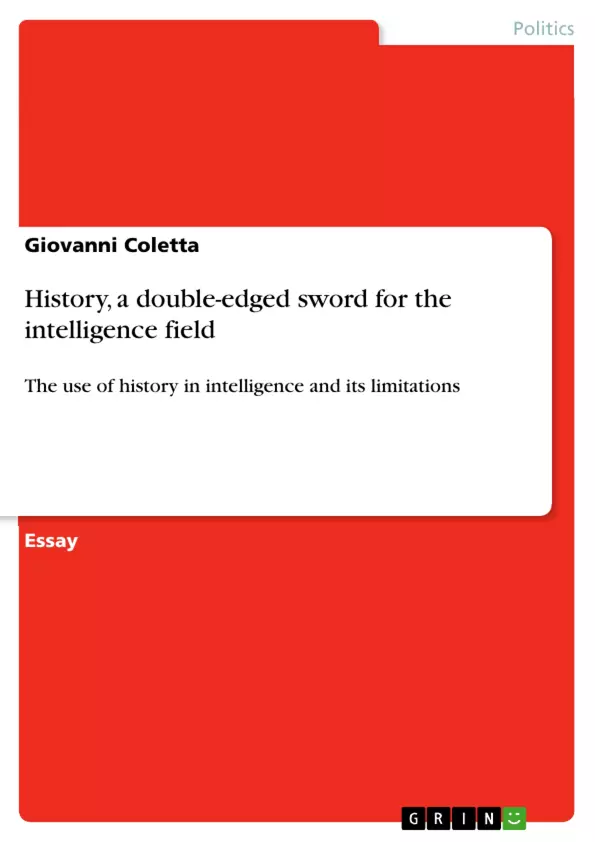The relationship between the study of history and the field of intelligence is intriguing and multi-faceted at the same time. The general assumption is that "by studying history, intelligence agencies can learn from past mistakes and aim to improve their performance" (Efren Torres). However, the truth of this belief must be weighed against some limitations that historians meet and that could affect their work.
Foremost, there is the problem of the bias of historians and how it can affect the objectivity of their work; secondly, the lack of applicable patterns in using history as a source from which to glean lessons learned; lastly, the inevitable gaps that historians encounter in seeking evidence of the past. This essay focuses on these limitations and on the extent to which they can affect the intelligence performance. It will be argued that the study of history is a double-edged sword to the intelligence field.
Inhaltsverzeichnis (Table of Contents)
- History, a double-edged sword for the intelligence field
- The Role of Historians and the Inevitability of Certain Restrictions in the Historical Research
- The Problem of Bias
- The Lack of Applicable Patterns
- The Gaps of Evidence
Zielsetzung und Themenschwerpunkte (Objectives and Key Themes)
This essay explores the relationship between history and intelligence, arguing that the study of history is a double-edged sword for the intelligence field. It examines three key limitations of historical research that affect the objectivity and applicability of historical analysis for intelligence purposes.
- The impact of historians' bias on their interpretations.
- The unreliability of pattern-making as a learning tool.
- The incompleteness of evidence and the challenges of declassification.
Zusammenfassung der Kapitel (Chapter Summaries)
- History, a double-edged sword for the intelligence field: Introduces the complex relationship between history and intelligence, highlighting the potential benefits and limitations of using historical analysis in the intelligence field.
- The Role of Historians and the Inevitability of Certain Restrictions in the Historical Research: Examines the role of historians as interpreters of the past and the inherent limitations of historical research, emphasizing the influence of present perspectives on historical understanding.
- The Problem of Bias: Discusses the potential for bias in historical research due to factors such as the historian's political or religious beliefs, personal agenda, and the influence of employers. It highlights the importance of recognizing and mitigating bias in historical interpretation.
- The Lack of Applicable Patterns: Analyzes the limitations of using historical patterns to predict future events, arguing that the complexity of human behavior and the lack of reproducibility in historical events make pattern-making a risky and potentially misleading exercise.
- The Gaps of Evidence: Explores the challenges posed by incomplete evidence in historical research, particularly in the context of declassified documents. It emphasizes the impact of missing information on historical understanding and the need for continuous re-evaluation of historical narratives.
Schlüsselwörter (Keywords)
The main keywords and focus topics of this text include: intelligence, history, bias, pattern-making, evidence, declassification, historiography, interpretation, objectivity, limitations, double-edged sword, historical research, intelligence agencies, historical analysis, historical precedent, historical events, historical narratives.
Frequently Asked Questions
Why is history a "double-edged sword" for intelligence?
While history offers lessons from past mistakes, it is limited by the bias of historians, lack of reproducible patterns, and gaps in evidence.
How does bias affect historical research?
Historians' political or religious beliefs and personal agendas can compromise the objectivity of their work, affecting how intelligence agencies interpret the past.
Can historical patterns predict future events in intelligence?
The essay argues that human behavior is too complex for reliable pattern-making, making it risky to assume that past events will repeat in the same way.
What are "gaps of evidence" in intelligence history?
These are inevitable missing pieces of information caused by classified documents, lost records, or the secrecy inherent in intelligence operations.
Is declassification sufficient for a full historical understanding?
No, even with declassification, many documents remain redacted or missing, requiring constant re-evaluation of historical narratives.
- Arbeit zitieren
- Giovanni Coletta (Autor:in), 2017, History, a double-edged sword for the intelligence field, München, GRIN Verlag, https://www.grin.com/document/356796



